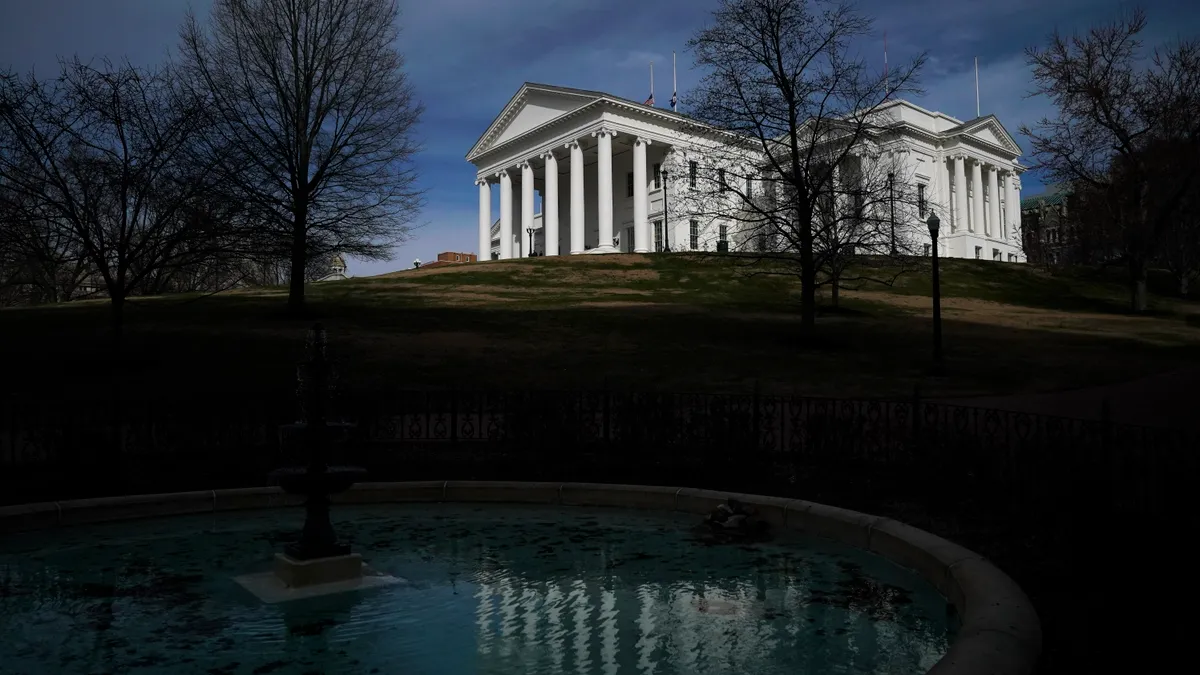Dive Brief:
- The most recent legislative session in Virginia saw Dominion Energy’s “grasp on the legislature … broken up,” said Clean Virginia’s executive director, Brennan Gilmore.
- The state legislature passed two significant bills this year returning regulatory power to the State Corporation Commission. However, the SCC is currently unable to act, as the split legislature can’t agree on making an appointment that would restore a quorum.
- Environmentalist and renewable energy groups have long battled against the legislative agenda of Dominion, which spent years as the top corporate donor in Virginia politics.
Dive Insight:
“Dominion has for decades now — through their political contributions, their lobbying work, their charitable giving — essentially been able to create their influence in the legislature and write the rules of their own regulation,” Gilmore said in an interview. “All of that ended this year. I don’t think Dominion has ever lost in the legislature as bad as they did during this session.”
Shelby Green, a researcher with the Energy and Policy Institute, agreed, saying in an interview that the passage of a bill giving the SCC more regulatory power over Virginia utilities’ rate of equity indicated to her that the utility is “starting to potentially lose some of the power that they have in the legislature.”
“In their Q4 earnings call, [Dominion was] talking about how the outcome of this legislation could influence their Moody’s rating,” Green said. “There was a lot of pressure for Dominion to deliver on increasing that rate of equity. While they were able to do that, it wasn’t what was proposed.”
The Virginia legislature passed HB 1770, which raised Dominion’s profit margin from 9.3 percent to 9.7 percent and fixed it there for two years, after which the utility’s profit margin will be set by the SCC.
Dominion initially lobbied to have the bill include favorable changes to the “peer group” of companies that SCC uses to calculate its profit level, but a measure aimed at accomplishing this was stripped from the House’s version of the bill by Republican Del. Terry Kilgore, the House majority leader.
After Dec. 31, the SCC no longer has to use the peer group calculation at all. Instead, it will be able to “use any methodology to determine such return it finds consistent with the public interest,” the legislation stipulates.
Virginia’s Republican-controlled House of Delegates and Democratic-controlled Senate also unanimously passed HB 1604, which expands SCC’s discretion to order reductions or increases when setting base rates for Appalachian Power and Dominion Energy Virginia.
Republican Gov. Glenn Youngkin supported both bills, and was a “huge friend to the ratepayer this session,” said Gilmore. “This was an important, and frankly unprecedented, reset of the regulatory compact.”
In spite of bipartisan efforts to give the SCC more regulatory power over utilities, Virginia Republicans and Democrats remain gridlocked over making appointments to the agency. Only one commissioner currently sits on the body, and a quorum of two is needed to issue rulings.
Any appointment has to pass through both chambers of the legislature, and neither party has wanted to give up the opportunity to nominate a friendly commissioner, particularly now that the SCC is more powerful and as Youngkin is working to withdraw Virginia from the Regional Greenhouse Gas Initiative, said Green.
“Once they're able to decide who is allowed to sit on the SCC, that will give a lot of power potentially either to Dominion or to pro-RGGI people, which is primarily Democrats who want to see Virginia move in a more clean energy direction,” Green said. “Both sides realize that.”














